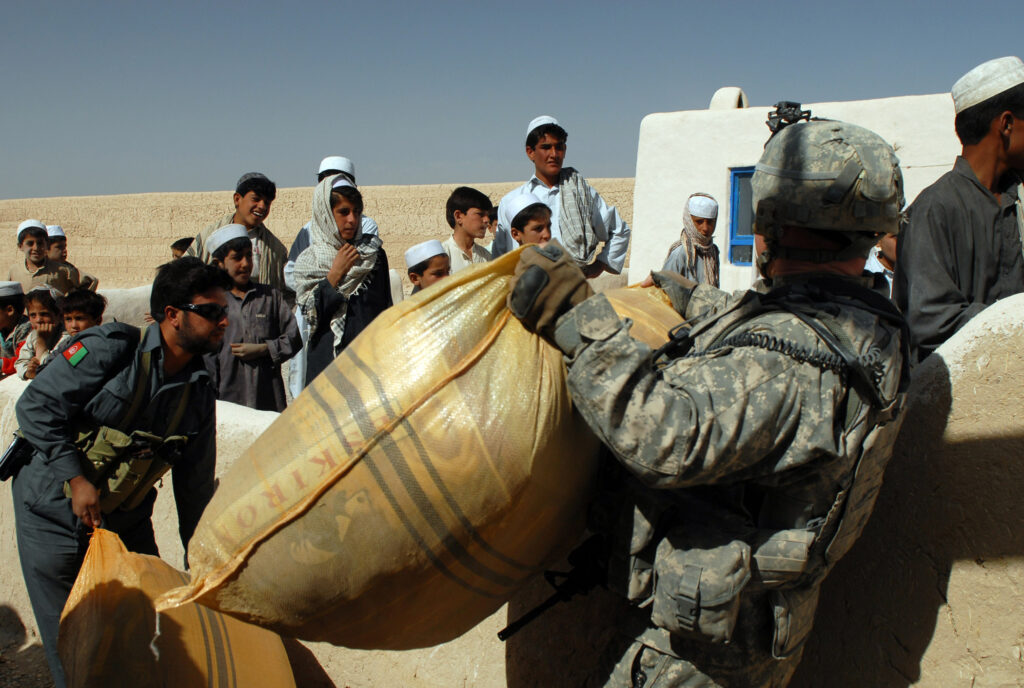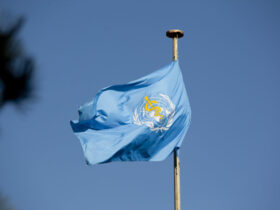The United States and the Taliban have a complex history, beginning with the sanctions against the Taliban in the 1990s, from the U.S. invasion of Afghanistan in 2001 to the present Taliban government takeover. A recession and a humanitarian crisis have followed, and with the poor plight of everyday Afghans, the Biden administration has grappled with a difficult issue: how does America provide international assistance to a country facing a humanitarian crisis while ensuring that the aid does not benefit the provisional Taliban government?
The earliest form of the Taliban was born in the 1990s in the aftermath of the Afghan Civil War. The group was primarily composed of students who had been educated and radicalized with extremist religious ideas. After the rapid spread of Taliban ideals, by the late 1990s, the Taliban had controlled the majority of Afghanistan. However, the Taliban’s power and control over the nation had mostly dissolved after the United States’ invasion of Afghanistan following the September 11th, 2001 attacks.
The United States remained in Afghanistan to try and build a democracy and the country’s infrastructure, attempting to create schools, roads and utilities in both urban and rural areas. However, many of these projects never took shape for two reasons: first, the United States diverted most of its money to its subsequent invasion of Iraq in 2003, and second, while the United States attempted to rebuild Afghanistan, it was waging a war against Afghans who were possibly in the Taliban or in the Mujahedin (allied Muslim anti-Western terrorist forces) who were mostly from rural areas.
Consequently, the United States fostered increasing resentment among Afghans, who created the second wave of Afghan fighters in the Taliban, this time primarily comprised mainly of everyday rural Afghans who were wrongfully accused of terrorism, cruelty and jihadism and subject to cruel and unusual punishment. This new Taliban gained power in secret, taking over the rural expanses of the country and slowly ambushing United States forces. Eventually, the Taliban waged an insurrection against the United States to become the interim government of Afghanistan in September 2021, with the new Taliban government leadership retaining many members from the Taliban of the 1990s.
Ever since this government takeover, Afghanistan has become an isolated country, deprived of international economic collaboration. Before the Taliban takeover, foreign assistance “funded 75%” of the government budget. However, the majority of the world currently refuses to recognize the Taliban as the legitimate government of Afghanistan. The Taliban is financially starved, and the government is crumbling without allies to assist the country’s needs. The United States alone has suspended aid granted through USAID, the World Bank and the International Monetary Fund. It has also frozen the Afghan government’s reserves held in bank accounts in the United States. Therefore, Afghanistan has catapulted into an economic recession and Afghans need significant economic and humanitarian assistance.
The situation progressively worsens with the onset of natural disasters that plague the region. Earthquakes are a very prevalent part of the country of Afghanistan and its surrounding area because of the prevalence of mountains and fault lines alongside the region. On June 22, in the Northeast Khost Province, over 1,000 Afghans died in a 5.9-magnitude earthquake, and thousands more were injured. This is the largest humanitarian disaster the Taliban has dealt with since becoming the government of Afghanistan.
The Taliban urges the international community to “provide immediate… aid” to help the affected Afghans and the government in this most recent crisis. Some nations, like China, have provided millions of dollars of humanitarian relief, but many nations, including the United States, remain hesitant to help. Since many nations refuse to recognize the Taliban as Afghanistan’s legitimate government, resources and aid are circumvented around the government and provided directly to Afghans. Still, only “5% of Afghan families have enough food” to sustain themselves nutritionally according to the World Health Organization as of late 2021, even with the onset of numerous forms of international assistance, and this number seems to become progressively worse as time continues.
In September of last year, the United Nations passed general licenses that allowed aid groups to continue assisting Afghan citizens by providing them with “basic human needs,” even while the United States maintained its sanctions on the Taliban. There is no limit on civilians receiving humanitarian assistance, but freezing governmental assets severely affects the people of Afghanistan, weakening everything their ability to access cash. Although the Biden administration has seized half of these frozen Afghan assets to provide humanitarian assistance to Afghans, this decision might actually hinder Afghanistan’s economic growth in the long run since monetary assets themselves are still frozen. Instead of Afghans providing for themselves with their own money, the Biden administration expects that humanitarian assistance can provide for the basic needs of Afghans. This cash shortage also affects humanitarian aid organizations, like the International Rescue Committee and Doctors Without Borders, organizations that have struggled to even pay their own staff in the country.
Additionally, humanitarian aid organizations are only temporary relief in otherwise flawed governmental provisions; eventually, there would have to be a long-term solution. There is added difficulty when nations are hesitant to provide aid to the Taliban, a government that is financially struggling. Finally, the United States and other nations must debate helping a government that could utilize this financial support and socioeconomic isolation to become a partially or entirely isolated regional threat, much like Russia or North Korea. Ultimately, there are few options for nations to assist Afghans.
To ensure protection for Afghans, the United States and other countries must continue to indirectly or openly support humanitarian aid, while diplomatically and strategically working to lessen Taliban extremism that could force the government into financial reliance on the international world. At the end of the day, there are millions of Afghan people who lack basic necessities and humanitarian assistance. The United States, a country significantly responsible for the current situation in the country, must contribute to actively better the situation, although the decision might always remain uneasy. After all, the international community’s inaction to help hurts not only millions of Afghans but all of humanity.







